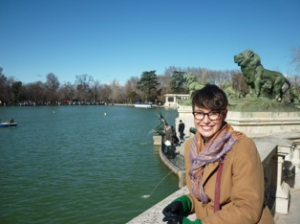
Finding a job
I had no idea what was awaiting me upon completion of the TEFL course at TtMadrid. I had the intention of staying in the city and finding work teaching English but was not sure how it would all fit into place, for example, if there would be a language barrier, if people would hire me without experience, etc. I needn’t have worried. There are plenty of teaching jobs in Madrid and a constant, if not nowadays heightened, need for qualified English teachers, which is great news for us! The guys at Tt, as well as grads who came into the school, reassured us that there was plenty of work to go round which was a real comfort. I remember thinking ‘well if they can do it, so can I’–and I was right.
As promised, TtMadrid helped with every step of finding a job. First of all, they made sure that we were all aware of the opportunities available; the different types of work, interview techniques, what to do when a Spaniard calls you on the packed metro but you neither understand a word they’re saying nor know what to reply. Secondly, they helped us create a CV suited to teaching. Finally, they blasted out our CV to their list of over 300 contacts. Personally, I waited a week or so after the course for them to send my CV because I wanted a week break before the onslaught of interviews. Others, however, had theirs sent out the last day of the course and were setting up interviews before we knew it. In all honesty, I am glad that I waited because I was not fully prepared for what was to come.
I received what felt like thousands of phone calls, voicemails and emails from academies wanting to set up interviews. I’m not going to lie; it was slightly overwhelming. There was the dreaded fear of when a number called you and you had no idea if the person on the other end could speak any English. However, the more calls that came in, the more used to it I got and knew the key things to ask for. I also saw it as a great way to practice my very basic Spanish. I would highly recommend learning the alphabet and numbers well as these will most definitely be needed. Oh, that and the @ sign in Spanish is arroba. Emails were of course easier as you had time to think of the response and could use my good old trusted friend, Google translate.
Looking at my diary now for that time, I was averaging around 2 or 3 interviews a day for about a week, which was hard work. The interviews were of course in all different parts of the city and I became great friends with the metro during that time. And Google maps. But again I saw it as another great opportunity; I was seeing more of the city and travelling to places I was yet to explore. The interviews themselves were very varied which I found unsettling. There were the academies that asked really difficult questions such as ‘how would you go about teaching the present perfect in a business English class?’ As you can imagine as a newbie to the TEFL world, these questions threw me. There were other academies where you would sit down, introduce yourself and they were starting to write up your teaching timetable. Similar to the phone calls, the more interviews I went to, the more accustomed I got to the types of questions, how to prepare myself, what questions to ask, etc. I actually began to enjoy the interview process because I saw just how many opportunities there were for me.
It was very much a waiting game; I was always waiting to see what was going to be offered next. Perhaps someone could offer me more block hours or better pay or offer help with resources–there’s a lot to consider. Eventually, I settled on the academies I felt most comfortable with and got a nice 10-hour timetable, which suited me just fine. I would advise going with your gut; some places you walk into and think ‘this isn’t for me’–trust that feeling. At TtMadrid we were advised that less is more when it came to taking on classes straight after the course, and they were right. Even 10 hours was a few too many if I’m honest. A few weeks went by and although lesson planning had taken over my life, I was enjoying my job. It is hard work and at the beginning, it feels like it is never going to get easier. Everyone tells you it will and that it comes with time. After three months of teaching, I’m starting to understand what they mean. You have materials and lessons prepared for various levels and groups and these can be adapted in many ways.
When I felt more comfortable with my workload I decided to try and find some more work. Unlike at the beginning of the job hunt, this time round I was prepared. I was a bit anxious that I wouldn’t find something to fit in with my schedule but once again this worrying was for nothing. TtMadrid offered to blast out my CV again with the hours I was looking for, which is really going above and beyond their call of duty. I managed to find work to fit my timetable and was working 14 hours. As my bank balance continued to decrease and lesson planning got slightly more manageable, I took on even more classes and for the most of May (2 months after completing my TEFL course) I was working 24 hours.
There really is a constant supply of work; perhaps sometimes you need to search a little harder for what you want or need, but it is possible. Finding a job teaching English in Madrid is definitely an experience and something that, as I am realizing, gets easier with time and experience. This is also due to the fact that you learn who you are as a teacher, the types of classes you would like, when you would like to teach, and the types of academies you prefer. Job-hunting can be a stressful experience, especially in a new city where you don’t speak the language. TtMadrid knows this and has first-hand experience finding TEFL jobs themselves. Therefore their help, support, and advice when you are trying to find work or more hours is priceless. I’ve had a very positive experience finding work here in Madrid and I am prepared for the onslaught of interviews in September when the new academic year starts!
Want to find our more about our courses? Click here to see our TEFL courses and prices in Madrid.
 As we move into the last week of the course, we have a job workshop to explain the type of English teaching positions that are available to you and the systems we have in place to get you teaching jobs initially and then our continued job support. This is available for as long as you need it—1 week, 1 year or the rest of your life if you like!
As we move into the last week of the course, we have a job workshop to explain the type of English teaching positions that are available to you and the systems we have in place to get you teaching jobs initially and then our continued job support. This is available for as long as you need it—1 week, 1 year or the rest of your life if you like!

